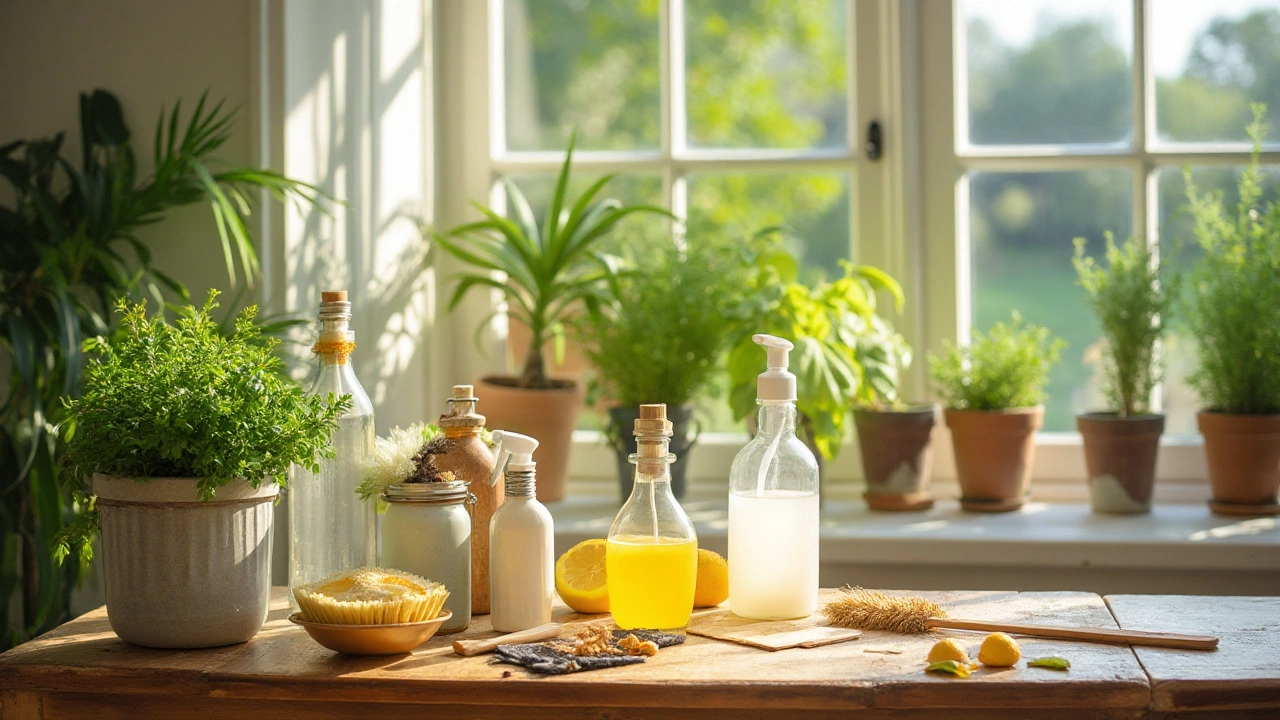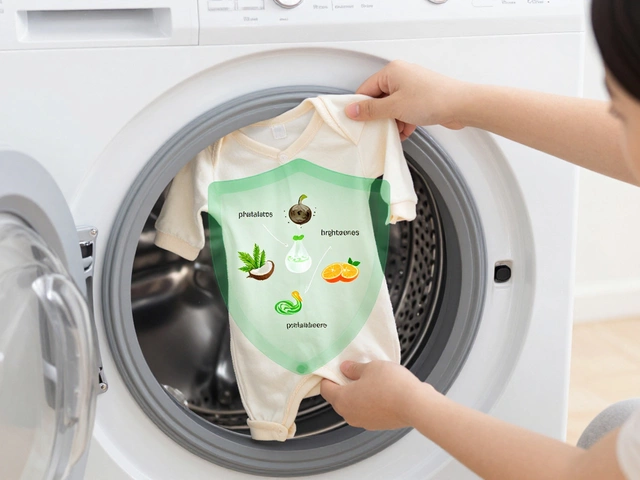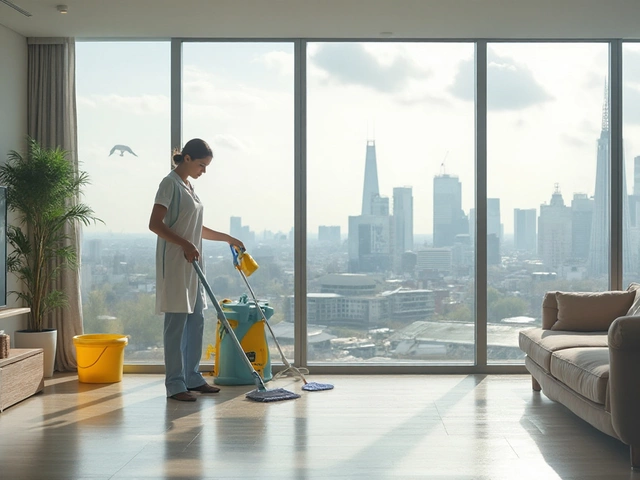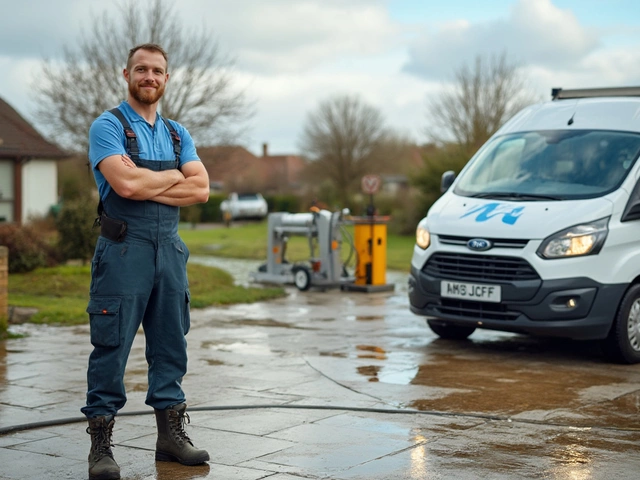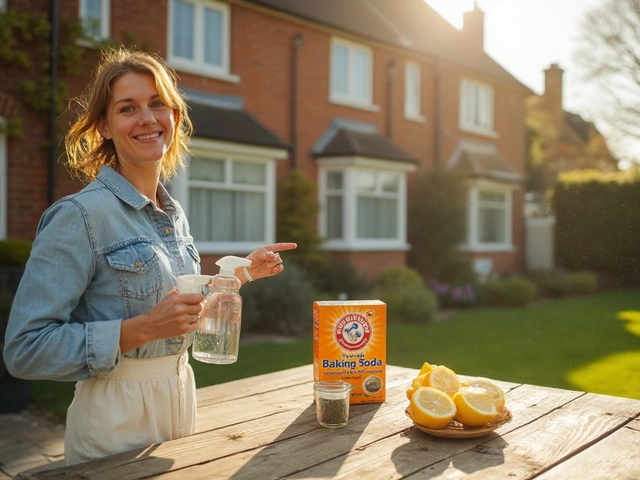In today's world, maintaining a clean home goes hand in hand with caring for the environment. But how do you clean effectively while being kind to our planet? Luckily, there's no need for harsh chemicals or synthetic cleaners that can damage both surfaces and the ecosystem. Instead, choose eco-friendly methods that offer a fresh and efficient way to tidy up.
From using baking soda and vinegar for sparkling kitchens to harnessing the power of essential oils for a fragrant and germ-free space, the possibilities are numerous and overlapping with everyday kitchen staples. You'll appreciate how these age-old solutions can offer robust cleaning abilities while keeping the toxic effects at bay.
- Natural Cleaners for Your Home
- The Power of Essential Oils
- Eco-Friendly Cleaning Tools
- Tips for Sustainable Home Maintenance
Natural Cleaners for Your Home
When it comes to maintaining a *sparkling home*, we've all faced the dilemma of choosing between effective cleaning and a cleaner planet. Thankfully, you can have both, thanks to the bounty nature offers in natural cleaning alternatives that are both eco-friendly and efficient. These earth-conscious options are not just good for the environment; they often come with fewer allergens and irritants, proving healthier for your family's home environment.
Consider baking soda, the humble white powder that resides in most kitchens. Its abrasive nature makes it an excellent scrub for tough stains on countertops and bathroom surfaces. Mixed with a little water, it forms an effective paste that can tackle grime in ovens or soap scum in showers. Throw in some elbow grease, and you'll find it effective for stain removal on a variety of surfaces. Interestingly, its deodorizing capability is unmatched, and a simple open box of it in a fridge can neutralize unpleasant odors, making it a versatile tool in the eco-friendly cleaning toolkit.
Then there's vinegar, renowned for its ability to tackle limescale and mineral deposits. Use equal parts vinegar and water to create a powerful all-purpose cleaner. This mixture is fantastic for cleaning glass, leaving windows streak-free and clear, which can be a major brightener in your home both practically and aesthetically. Vinegar also works wonders in bathroom areas; it can help dissolve the chalky build-up around faucets and in shower heads, ensuring your water flows freely. If you're worried about the smell, rest easy; it dissipates quickly as it dries.
The Sweet Scent of Citrus
For those who prefer their homes to have a fresh fragrance, the essence of citrus fruits such as lemon and lime offers natural cleaning properties and a delightful aroma. Lemon juice contains citric acid, making it a natural antibacterial cleaner that can break down grease on kitchen surfaces. It's a superb choice for wooden cutting boards and butcher blocks where harmful bleach wouldn’t be suitable. Just rub the surface with a half-cut lemon, sprinkle with some salt, and give it a good scrub. Your kitchen will be left smelling naturally fresh and tangy.In the words of Miranda Price, a renowned expert on sustainable living, "The changes start at home, one small step at a time. Replacing your household cleaners with natural solutions can lead to a safer home and a healthier planet."
Even that natural nectar from bees, honey, can assist in unique ways. Its natural enzymes can be used for specific staining, especially when combined with ingredients like lemon juice. While not as common, the results prove fascinating. The takeaway? There's a plethora of options when exploring sustainable methods, and sometimes, it's those everyday items that offer unique solutions for a healthier home and a happier planet.

The Power of Essential Oils
Essential oils have been cherished for centuries, not only for their aromatherapeutic benefits but also for their immense cleaning potential. From the delicate scent of lavender to the invigorating aroma of eucalyptus, these oils offer more than just fragrance—they pack strong antimicrobial and antiseptic properties that make them an excellent choice for eco-friendly cleaning. When it comes to sanitizing surfaces or freshening up a room, essential oils can be used in a variety of ways. For instance, you can create a powerful all-purpose spray by combining vinegar with a few drops of tea tree oil and lemon oil. This concoction is not only effective in eliminating bacteria and viruses but also leaves a refreshing scent behind.
The versatility of essential oils extends to tackling odors as well. Peppermint oil, for example, is particularly effective at neutralizing unpleasant smells. Simply add a few drops to a cotton ball and place it in stinky areas like bins or shoe closets. Green cleaning methods like these leverage the natural potency of essential oils, making them an invaluable tool in maintaining a fresh and healthy home environment. Moreover, these oils are often found in products that claim to be 'natural,' yet using them in their pure form allows you to control potency and mix as per your needs.
Incorporating essential oils into your cleaning routine doesn't just benefit your home; it can also impact personal well-being. The calming properties of oils such as lavender can make cleaning less of a chore and more of a relaxing ritual. A study published in the Journal of Physiological Anthropology suggests that certain essential oils may reduce stress and improve mood, which serves as a double benefit during your cleaning sessions.
"Essential oils are nature's gift to us, capable of cleansing more than our physical space but also providing mental clarity," noted Mary Landers, a well-respected aromatherapist.
When selecting essential oils for cleaning, ensure you're choosing high-quality, pure oils. Some products might be diluted or synthetic, reducing their effectiveness. Always check labels for purity and source. Luckily, a small amount goes a long way, making essential oils an economical choice for those committed to sustainable cleaning. While they do a fantastic job on their own, essential oils can also be combined with other natural ingredients like baking soda or castile soap to tackle tougher cleaning jobs. This multi-purpose capability makes them a staple for anyone looking to maintain a clean yet environmentally sustainable living space.
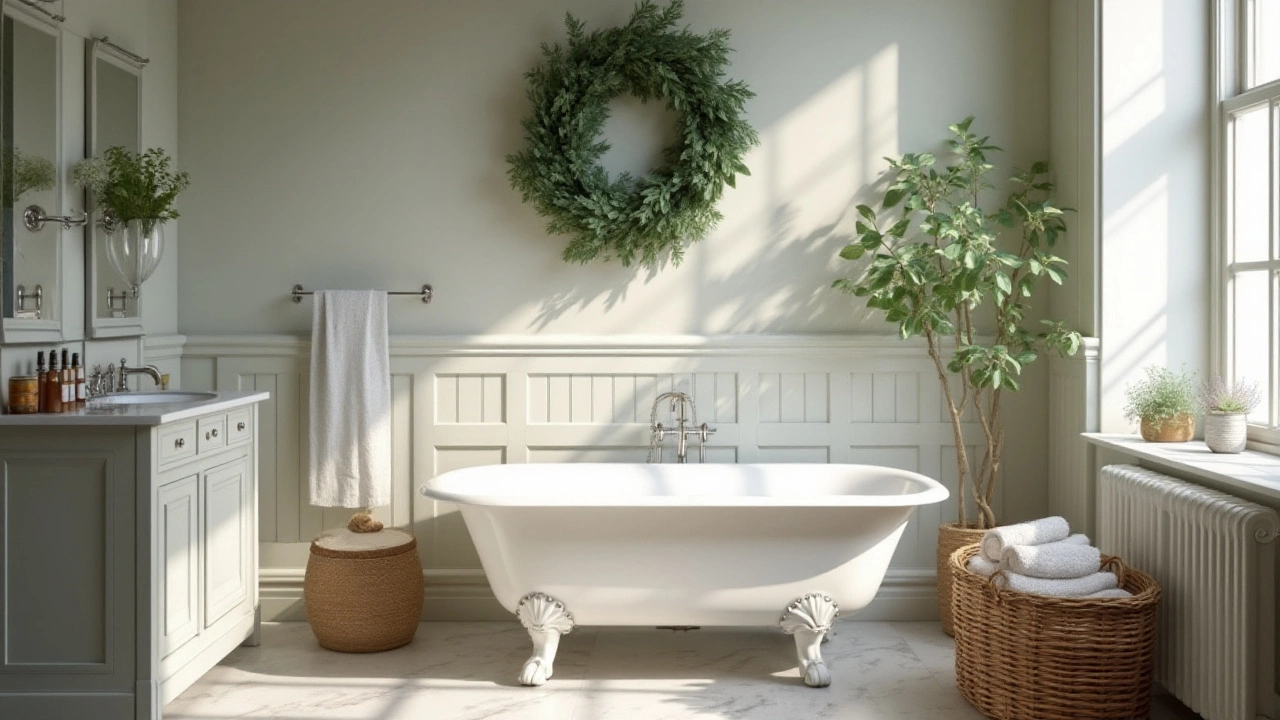
Eco-Friendly Cleaning Tools
As we move towards a more environmentally conscious lifestyle, selecting the right cleaning tools is as important as choosing non-toxic cleaning products. Traditional cleaning equipment often utilizes materials that can be harmful to our planet, leaving a significant carbon footprint. However, by opting for eco-friendly cleaning tools, you not only reduce waste but also keep your living space just as clean and inviting.
One of the pioneers in sustainable cleaning tools is the bamboo cleaning brush. Bamboo is not only a rapidly growing renewable resource but it's also naturally resistant to bacteria, making it a perfect candidate for items like scrub brushes. These brushes are durable and designed to last longer than typical plastic alternatives, ensuring you get the most out of your investment while contributing less to the landfill.
Reusable microfiber cloths are another fantastic choice for eco-friendly living. Unlike single-use paper towels that are a bane to our forests, microfiber cloths can be washed and reused hundreds of times. They excel at trapping dirt and dust without the need for additional cleaning agents, which in return lessens the reliance on artificial cleaners. This makes them a favored choice for sustainably maintaining cleanliness.
"Microfiber cloths reduce the need for chemical cleaning solutions by up to 95%," according to a study by the Environmental Protection Agency.
Among the smart solutions used for a greener clean is the steam mop. It provides the dual benefits of sterilizing surfaces and removing stubborn grime merely with the power of steam—eliminating the need for chemical disinfectants. While steam mops may have a higher initial cost, their use of plain water instead of multiple cleaning products balances the investment over time both in terms of finances and environmental impact.
Don't overlook the power of recycled plastic in sustainable cleaning. Many companies have begun to produce durable cleaning supplies, such as buckets and spray bottles, using recycled materials. By choosing these options, you're supporting the circular economy—a model focused on reusing and recycling materials to keep them in circulation for as long as possible.
Additionally, keep an eye on solar-powered devices as they slowly make their way into the cleaning space. Solar-powered vacuums and robotic devices are emerging as part and parcel of sustainable living, saving on energy while cutting down on electricity bills. Though in the infant stages of becoming mainstream, these innovations offer a glimpse into the future of eco-friendly home maintenance.
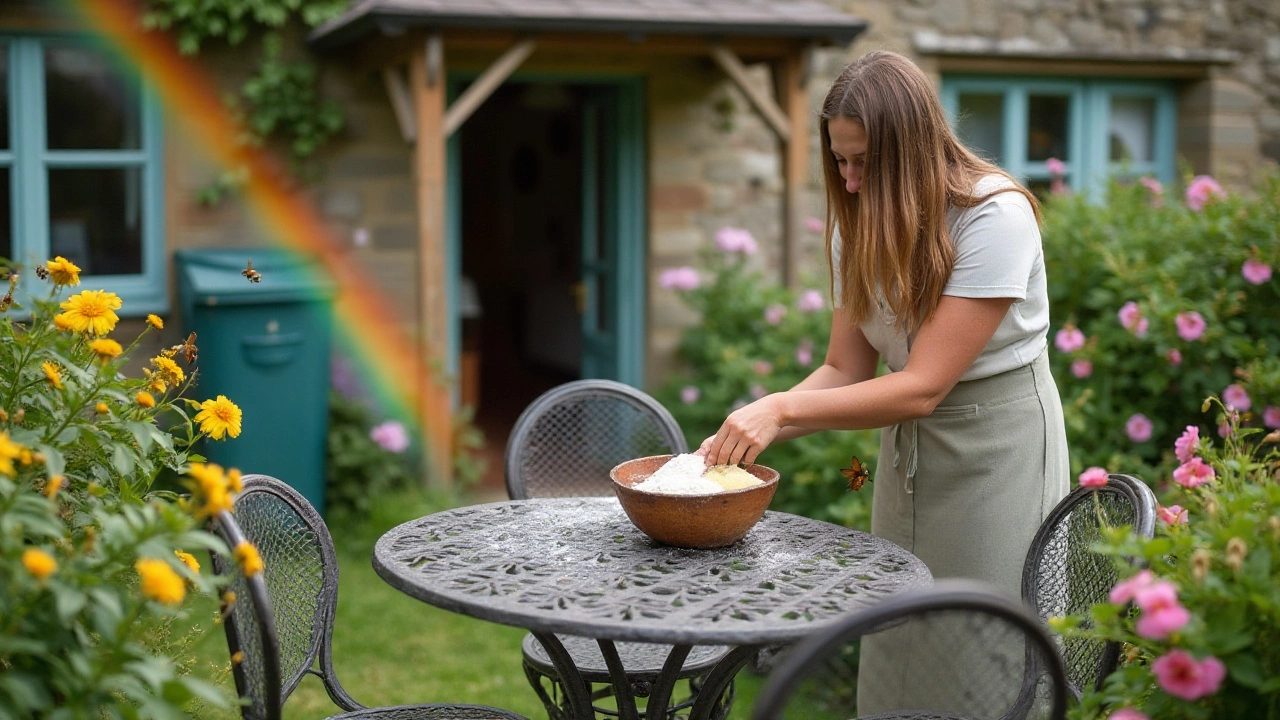
Tips for Sustainable Home Maintenance
Embracing sustainable maintenance practices within your home is not only beneficial for the planet but also advantageous for your wallet. With the ever-growing concern for environmental health, adopting greener methods in daily home chores is a path many are taking. A good start is assessing how much water and energy your household uses. Simple changes, like fixing leaky faucets and installing energy-efficient light bulbs, can yield significant savings and reduce your overall ecological footprint. Did you know that about 10% of homes have leaks that waste 90 gallons or more per day? Fixing these can prevent not just water wastage but also lead to lower utility bills.
Transitioning to eco-friendly cleaning products is another impactful step. Swapping conventional cleaners that often contain harmful chemicals for those marked as environmentally friendly can dramatically decrease indoor pollution. Products with labels claiming biodegradability or non-toxicity assure that they break down faster in nature and harmlessly. You might be surprised to learn that many of these products are equally effective, and some are even made using plant-based ingredients. Feel empowered as a consumer by supporting brands that prioritize sustainability in their production processes.
Maintaining a sustainable home involves looking at everyday habits with a fresh perspective. Consider recycling and composting as key components. These steps minimize landfill waste, and many communities now have robust collection systems to support them. Composting, for instance, turns kitchen scraps into rich fertilizer, reducing waste while enhancing soil health. Interestingly, according to the EPA, composting food scraps can reduce waste collection needs and methane emissions at the source. Feel free to use this enriched soil in your garden to foster a more sustainable home environment.
Energy conservation is a crucial area for many eco-conscious homeowners. Consider adopting habits that reduce energy consumption, like unplugging appliances when not in use and using programmable thermostats. These actions aren’t just beneficial to the environment but can also slash your energy bills considerably. According to Energy Star, proper use of programmable thermostats can save about $180 every year in energy costs for an average household. It’s wise to equip your home with modern energy-efficient appliances; they often require less energy to operate, saving you money and reducing greenhouse gas emissions.
Implementing these eco-friendly cleaning strategies can transform how you maintain your home, leading to a healthier, more sustainable lifestyle. Roosevelt once said, "Do what you can with what you have, where you are."
Embracing sustainability is not about perfection but progress. It’s about making conscious choices daily, using resources wisely, and improving for the next generations.Start small, perhaps in one area of your home, and gradually encompass your entire living space.
